Climate change is the biggest collective threat we’ve ever faced. But it is also a historic opportunity – it is our chance to change the world. And as people across the world rise to the challenge, we are starting to see stories of that happening in a really positive way.
Here are some of our favourite initiatives so far:
1. Ghana Bamboo Bikes Initiative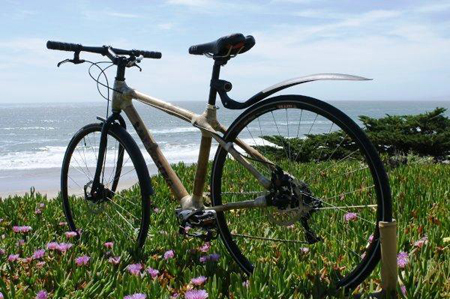
Ghana Bamboo Bike Initiative is a non-profit enterprise led predominantly by the youth. It makes use of the abundant bamboo raw materials in Ghana to manufacture high quality, road-worthy bamboo bikes that are affordable to everyone.
The frames are light and stable, making the bikes suitable for Ghana’s rough terrain. The bikes are able to transport passengers, water, large farm loads and even patients.
The Bamboo Bike making technology has now been transferred to two other communities employing 25 rural women who sell the frames to the Ghana Bamboo Bikes Initiative’s supply chain. The Initiative is talking to investors and potential funders to scale up the project, both in size and impact. Organizers aim to build bikes – in Ghana, by Ghanaians, for Ghana – in the thousands.
Each artisan, after their training, will be equipped to employ at least five or six people, and to set up their own small-scale production base in any part of the country. As part of its scaling-up strategy, the Initiative plans to establish a bamboo plantation to support climate mitigation.
2. The Mobile Solar Computer Classroom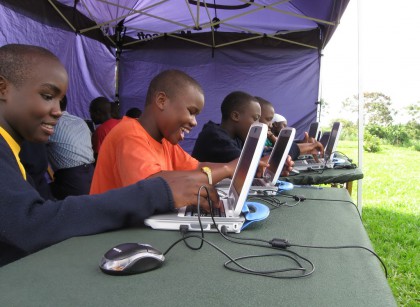
The Mobile Solar Computer Classroom enterprise makes computer skills affordable and accessible to rural schools and community libraries in Uganda.
Solar powered computers are transported in modified SUV vehicles fitted with solar panels, bringing this technology to communities across Uganda. “Every year, the Mobile Solar Computer Classroom equips 5,000 students, 100 teachers and 500 community members with competitive computer skills. While doing this, it also educates its trainees in the benefits of using solar power.”
A digital literacy curriculum is offered over the course of two years and institutions pay a small fee for the training sessions, the bulk of the funding comes from partnerships, grants and awards. Thus far the enterprise has two modified vehicles equipped with solar panels, laptops, an internet router, a tent, tables, chairs and all other equipment required to provide lessons on computer skills to schools and libraries.
3. The Warka Water Tower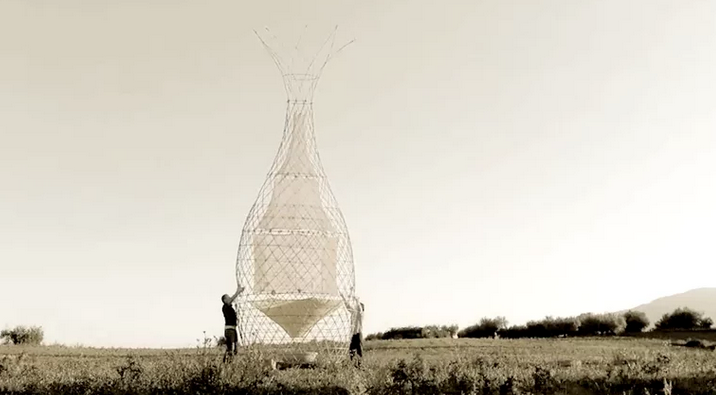
The warka water project is an alternative solution for rural populations in Ethiopia that face challenges in accessing drinkable water. In some parts of Ethiopia, finding potable water is a six hour journey, and when they do find it, the water is often contaminated with infectious bacteria, animal waste or other harmful substances.
The structure is made from biodegradable materials that are easy to clean and can be erected without mechanical tools in less than a week . The Warka towers were inspired by the local Warka tree, a fig tree that is native to Ethiopia and is commonly used as a space where the community gathers. The Warka towers are made of bamboo woven together to form the towers vase like structure. The inside is composed of a plastic mesh material made of nylon and polypropylene fibers that act as micro tunnels for daily condensation. As condensation droplets form, they flow along the mesh pattern into the basin at the base of the towers. By harvesting atmospheric water vapor, it’s estimated that the towers collect at least 25 gallons of potable water every day.
4. All Women Recycling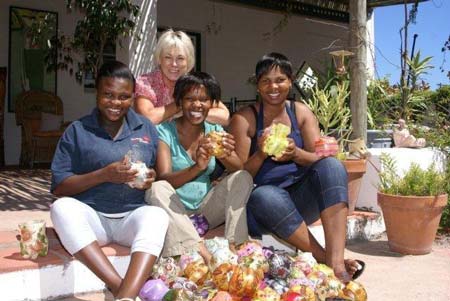
The All Women Recycling enterprise in Cape Town, uses discarded plastic bottles to create gift boxes, which are then sold internationally. This venture employs predominantly young women, especially unemployed single mothers.
The discarded plastic bottles are sourced from street waste collectors, collection points located at schools and from landfill sites. The production of these The Klikety Klik boxes, as they are called, strengthens environmental awareness as well as cleaner communities, particularly in schools where plastic bottle collection sites are set up.
5. Earth Roofs in the Sahel Program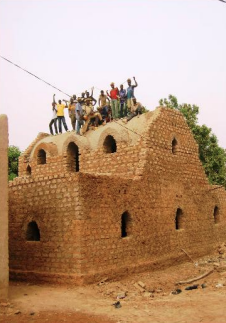
In sub-Saharan Africa, deforestation has led to a shortage in timber and straw, which is traditionally used in the construction of roofs for housing and buildings. Millions of people in the Sahel suffer from lack of access to affordable housing. Families use whatever little money they have on expensive imported timber and sheet metal to construct their houses, worsening the cycle of poverty experienced by millions in these regions.
The Earth Roofs in Sahel Programme is a programme to address this housing problem with a low-cost and low-carbon building technique known as Nubian Vault. The Nubian Vault technique uses bricks made from the locally available earth and water that is dried in the sun. Houses built using this technique are better insulated from heat, cold and noise and are healthier to live in. These structures can last for 50 years or more if properly maintained.
The program trains craftsmen to become independent contractors, in turn, builders who have learnt these techniques supervise the building sites and help train other apprentices.
Do you have positive stories about fighting climate change? Let us know on Facebook.
